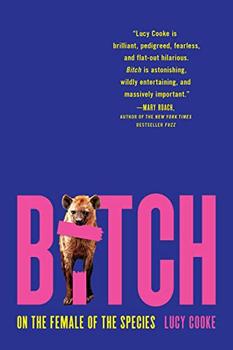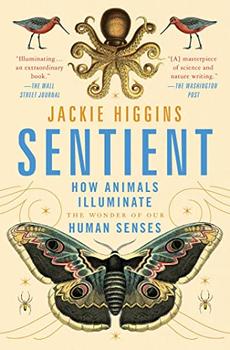Summary | Excerpt | Reviews | Beyond the book | Read-Alikes | Genres & Themes | Author Bio

On the Female of the Species
by Lucy CookeIn middle school biology class, many of us were told that men hunt and women nest, that testosterone-driven males dominate in the animal kingdom, and that females are naturally disposed to motherhood and nurturing their helpless offspring. The problem is that these shibboleths aren't backed up by unwavering scientific evidence, as Lucy Cooke eloquently and enjoyably explains in Bitch: On the Female of the Species.
The nod in the title to Darwin's On the Origin of Species (1859) is very apt. Cooke demonstrates, chapter by chapter and species by species, that while the great man's theory of natural selection was truly groundbreaking, his related theory of sexual selection — which explains, for example, why peacocks have a huge tail that attracts a mate but doesn't otherwise help with survival — reflected Victorian gender stereotypes as much as observational science. By declaring females as "passive" and males as "active," Darwin's theory of sexual selection grossly oversimplifies sex and gender in the animal kingdom, including its Homo sapien members. Over time, this theory hardened into a sexist bias in biology.
But this book is not iconoclastic — Cooke deftly places Darwin in his proper social context. He was infused with a male-centric mentality and approach to science that stretches all the way back to Aristotle, whose work would have been part of a 19th-century gentleman's education. Cooke's contribution is to correct the record via robust evidence, building upon the fundamentals of how animals pass on their genes, and showing the astonishing ingenuity and variety found in female animals that have so often been overlooked by zoologists.
She begins by breaking down myths about the genetic immutability of XY and XX chromosomes, showing that animals can and do change their sex, and that developing into a female is no passive affair. With examples as varied as birds, fruit flies and a range of primates, she also demolishes myths about females as naturally monogamous or unwilling to seek multiple sexual partners — a belief that started with Darwin but was reinforced by scientists for decades.
Cooke provides many colorful examples, such as female langurs, a species of monkey that has sex with multiple males to prevent them from killing their already-born offspring; spiders who eat both the males that don't pass genetic muster as well as the ones they decide to mate with; and ruthlessly violent meerkat mothers who kill their own sisters and daughters to maintain reproductive dominance and mate with all the available males.
She also shows that females have much more control over their bodies and social groups than traditionally thought. For example, female ducks who are often attacked and forcibly mated by males seem like the model of passivity. But, as Cooke explains, they've evolved complex internal organs and mechanisms of preventing or encouraging fertilization by the sperm of certain males and not others — exerting the ultimate control over reproduction.
She breaks down stereotypes about male primates dominating social hierarchies with examples of bonobos, whose female-female sexual activity forms the basis of social groups; and chimpanzees, where a female acts as the matriarch and glue holding the clan together. She even tackles the seemingly anomalous evolutionary trait of menopause, explaining how menopausal orcas are crucial members of their pods, thanks to their decades of feeding ground knowledge and survival skills.
Just as important as the richness of female animalia is the groundbreaking work of female scientists Cooke highlights. Names like Sarah Blaffer Hrdy and Patricia Gowaty aren't as well-known as Richard Dawkins or even Jane Goodall, but that's because their research — the examples and findings of which Cooke shares in the book — flew in the face of accepted Darwinian science that had been bolstered by over a century of confirmation bias. Speaking of the majority of zoologists over the 19th and 20th centuries, she explains, "They looked for evidence in support of the passive female prototype, and saw only what they wanted to see." Popularizing the research of female scientists who were told time and time again that their conclusions were wrong and had paper after paper rejected is a corrective as valuable as the research itself.
Not only is Bitch enlightening, but it's also entertaining. Told with verve, humor and plain-language explanations of scientific processes, Cooke's book reads like a travelogue through the still-wild places of the Earth, revealing the complexity of animal life that most of us will never glimpse, and narrated with the tone of a good friend confiding her adventures to the reader. She never hesitates to call out the persistent sexism in academic science, and her rollicking pace and vibrant descriptions ensure the reader is eager for the next exploration and the next stereotype to be taken down.
A vital remedy to sexist scientific theory, Bitch is also just a first step. It deserves a place on both popular and scientific reading lists so that other scientists — of all sexes and genders — can take up this important baton and better illuminate the fascinating nature of all animal life.
![]() This review was originally published in The BookBrowse Review in August 2022, and has been updated for the
October 2023 edition.
Click here to go to this issue.
This review was originally published in The BookBrowse Review in August 2022, and has been updated for the
October 2023 edition.
Click here to go to this issue.

If you liked Bitch, try these:

by Cat Bohannon
Published 2025
The real origin of our species: a myth-busting, eye-opening landmark account of how humans evolved, offering a paradigm shift in our thinking about what the female body is, how it came to be, and how this evolution still shapes all our lives today

by Jackie Higgins
Published 2022
Perfect for fans of The Soul of an Octopus and The Genius of Birds, this remarkable book explores how we process the world around us by analyzing the incredible sensory capabilities of thirteen animals and reveals that we are not limited to merely five senses.
Your guide toexceptional books
BookBrowse seeks out and recommends the best in contemporary fiction and nonfiction—books that not only engage and entertain but also deepen our understanding of ourselves and the world around us.